Fire Warms the Northern Lands -- A Prussian AAR
- Thread starter Rensslaer
- Start date
-
We have updated our Community Code of Conduct. Please read through the new rules for the forum that are an integral part of Paradox Interactive’s User Agreement.
You are using an out of date browser. It may not display this or other websites correctly.
You should upgrade or use an alternative browser.
You should upgrade or use an alternative browser.
For Vicky, likely Mexico. For HoI2, likely Italy.Rensslaer said:I'd enjoy seeing an FJ44 Vicky AAR. What country do you figure?
They are, after all, the coolest countries to play in their respective games.
I'll probably do a HoI2 one first, as I have a lot more experience with that game.
Congratulations, Renns, it's recognition long overdue.  Now that you're an award winner expect us to double our demands for updates!
Now that you're an award winner expect us to double our demands for updates! 
Indeed. We salute you!VILenin said:Congratulations, Renns, it's recognition long overdue.Now that you're an award winner expect us to double our demands for updates!

VILenin is right, though. Update!
From The Eagle Rising: The Story of Prussia's Arrival On the World Stage, pub. 1989 by Professor Reinicke Herz
In 1890, the Ottoman Empire reclaimed for its own most of the remaining territory of the Egyptian Caliphate. In 1893, Prussia moved soldiers into Cairo, deposed the Caliph, and integrated the last vestiges of independent Egypt into its colonial territories.
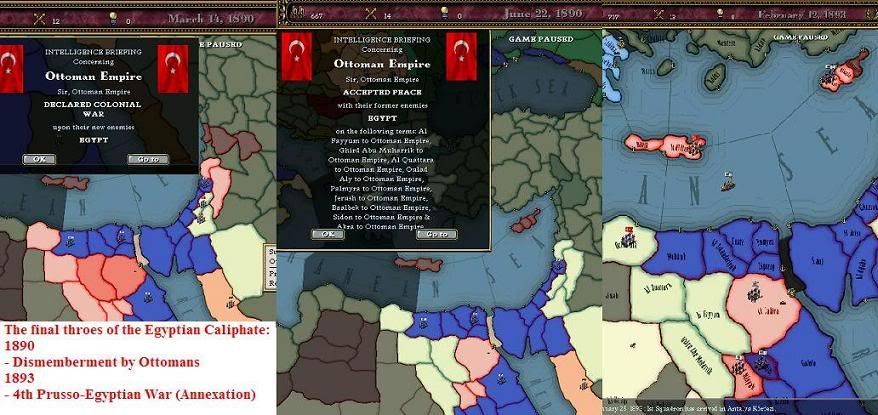
Between 1880 and 1895, Prussian colonial policy with regard to Africa was fourfold. 1) To reach into the interior of West Africa, toward the Saharan trading post of Timbuktu. 2) To secure the Red Sea coast and the Suez Corridor. 3) To stretch a belt of Prussian colonial outposts across the waist of central Africa, from the Congo to the Horn. 4) To contain British and Portuguese colonial ambitions from expanding out of south Africa, halting any further hold on the continent to which they might aspire.
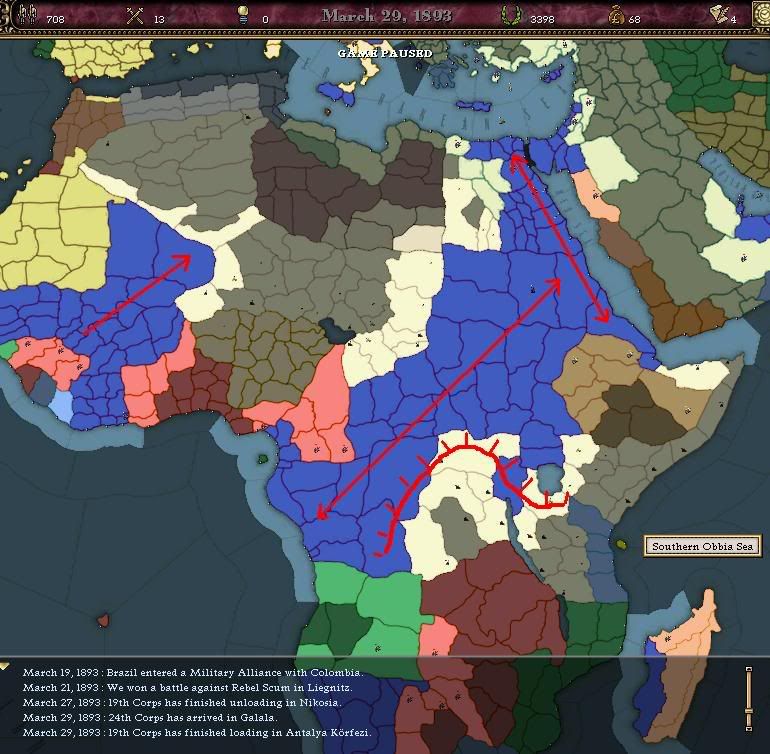
The first goal proceeded slowly throughout the final two decades of the 19th Century. The second was effectively achieved in 1893, with broadened goals to be pursued through the early years of the 20th Century.
The fourth was a result of the third, implemented through a series of missions (primarily Lutheran, but also Catholic) and trading posts through central Africa, and enforced by several forts – at Coquilliatville and Bangassu in the Congo, at Shekka in the southern Sudan, and at Mwanza and Turkana on the shores of Lake Viktoria (named by Kaiser Friedrich III in honor of the Kaiserin). The eastern coast of Africa was effectively denied to the British and Portuguese by the Omani presence, though that became another aspect of Prussian colonial policy as these years wore on.
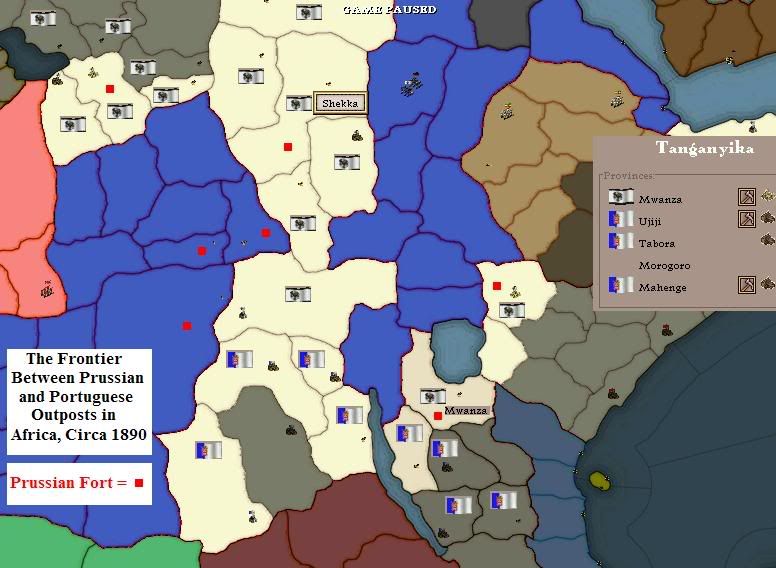
While the British were more or less out of the “Scramble for Africa” by the last quarter of the 19th Century, the Portuguese certainly did not consider themselves so, and vied to contest Prussian control of these regions. However, once the Prussian forts were in place there was not much the Portuguese had to say about the matter. They had no similar degree of hold on the northern frontier of their colonial possessions.
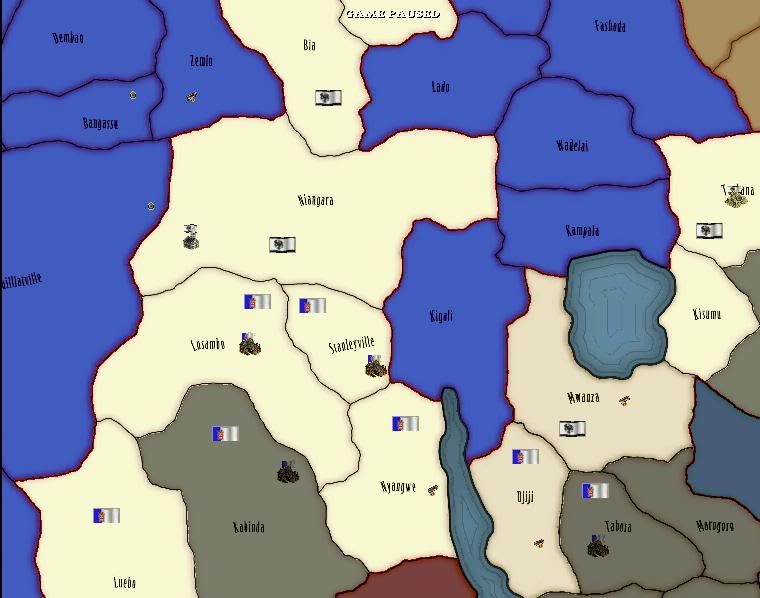
Between 1880 and 1895, Prussia established no fewer than 17 missions, 5 trading posts, and 7 forts in Africa.
In 1891, Prussia completed the first link of the TransAfrikana Railway, reaching from the mouth of the Congo River in the west, to Yebuti on the Red Sea. By 1894, the railway reached as far as Alexandria, very usefully linking the Mediterranean Sea to the Indian Ocean to the Atlantic Ocean. Besides the tremendous strategic and economic value of such a network, it also helped Prussia effect its control of the central African region.
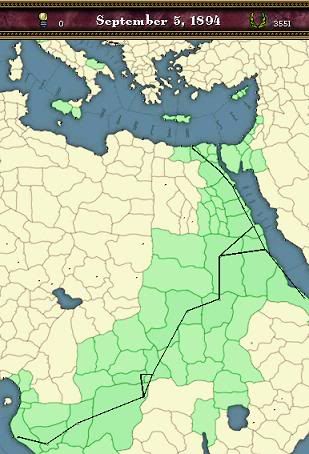
The Suez Canal finally opened, late in 1893, fulfilling the purpose of a good part of Prussia’s Africa policy over several decades. Access for Prussian and Prussian-allied ships to the Indian Ocean via the Mediterranean was assured.
In 1890, the Ottoman Empire reclaimed for its own most of the remaining territory of the Egyptian Caliphate. In 1893, Prussia moved soldiers into Cairo, deposed the Caliph, and integrated the last vestiges of independent Egypt into its colonial territories.

Between 1880 and 1895, Prussian colonial policy with regard to Africa was fourfold. 1) To reach into the interior of West Africa, toward the Saharan trading post of Timbuktu. 2) To secure the Red Sea coast and the Suez Corridor. 3) To stretch a belt of Prussian colonial outposts across the waist of central Africa, from the Congo to the Horn. 4) To contain British and Portuguese colonial ambitions from expanding out of south Africa, halting any further hold on the continent to which they might aspire.

The first goal proceeded slowly throughout the final two decades of the 19th Century. The second was effectively achieved in 1893, with broadened goals to be pursued through the early years of the 20th Century.
The fourth was a result of the third, implemented through a series of missions (primarily Lutheran, but also Catholic) and trading posts through central Africa, and enforced by several forts – at Coquilliatville and Bangassu in the Congo, at Shekka in the southern Sudan, and at Mwanza and Turkana on the shores of Lake Viktoria (named by Kaiser Friedrich III in honor of the Kaiserin). The eastern coast of Africa was effectively denied to the British and Portuguese by the Omani presence, though that became another aspect of Prussian colonial policy as these years wore on.

While the British were more or less out of the “Scramble for Africa” by the last quarter of the 19th Century, the Portuguese certainly did not consider themselves so, and vied to contest Prussian control of these regions. However, once the Prussian forts were in place there was not much the Portuguese had to say about the matter. They had no similar degree of hold on the northern frontier of their colonial possessions.

Between 1880 and 1895, Prussia established no fewer than 17 missions, 5 trading posts, and 7 forts in Africa.
In 1891, Prussia completed the first link of the TransAfrikana Railway, reaching from the mouth of the Congo River in the west, to Yebuti on the Red Sea. By 1894, the railway reached as far as Alexandria, very usefully linking the Mediterranean Sea to the Indian Ocean to the Atlantic Ocean. Besides the tremendous strategic and economic value of such a network, it also helped Prussia effect its control of the central African region.

The Suez Canal finally opened, late in 1893, fulfilling the purpose of a good part of Prussia’s Africa policy over several decades. Access for Prussian and Prussian-allied ships to the Indian Ocean via the Mediterranean was assured.
Hurrah and Huzzah!!
Nice to see a German Africa for a change, however I have the feeling that the Portuguese weren't all that happy 'bout that, eh?
So, what's next on the agenda for the great German Reich?
Nice to see a German Africa for a change, however I have the feeling that the Portuguese weren't all that happy 'bout that, eh?
So, what's next on the agenda for the great German Reich?
Great stuff Renss, but the opposite bank of the Red Sea is in Muslim hands, how can this be allowed to continue.
Finnally an update  love this AAR. Few day's ago before I signed up I found it and spent 16 hours reading through it. Sadly my fix has been cut off
love this AAR. Few day's ago before I signed up I found it and spent 16 hours reading through it. Sadly my fix has been cut off  since I've caught up! Games coming to a close what's your plans? To go out silently or go out with a bang. I say take England and the bear at once
since I've caught up! Games coming to a close what's your plans? To go out silently or go out with a bang. I say take England and the bear at once  you can do it
you can do it 
Indeed.CatKnight said:Damn that's a lot of Prussian blue!
Rensslaer: Great work, though I fear for your relations with the UK after pretty much annexing Africa to the Prussian Crown.
Out of curiosity, do you know when the first RR to span from the Red Sea to the Atlantic was built. I have the feeling it was after the timespan of the game. If so, huzzah! You've made a lasting mark on history. Congratulations!
- 1
FJ44, thank you about TransAfrikana, and Lake Viktoria, also! I'd bet you're right about the railroad... I doubt any power even had that lateral band across Africa. It was quite a hodgepodge, except in west Africa, which was mostly French. The Brits did a better job of moving north from South Africa to the Horn. That's the only equivalent I can think of.fj44 said:Rensslaer: Great work, though I fear for your relations with the UK after pretty much annexing Africa to the Prussian Crown.Another thing, the TransAfrikana railroad is ingenious. Excellent roleplaying, and glad to see the rationale for Lake Viktoria.

Out of curiosity, do you know when the first RR to span from the Red Sea to the Atlantic was built. I have the feeling it was after the timespan of the game. If so, huzzah! You've made a lasting mark on history. Congratulations!
Relations with Britain are none so hot, but it's not because of Africa. The Portuguese pretty well knocked the Brits out of the running for Africa before they reached the Prussian lines. Might have been because of Longanecker and his Stralsund Cavalry buddies keeping the Brits busy in S. Africa, but...
Iron Skull! Thank you for taking time to read so much material! There is much action coming... There's Russia and some other folks out there.
BBBD, Arabia awaits, too.
Draco, no the Portuguese weren't happy.
Rey... ... Hmm... Not a word. <<winks>>
Welcome, LordScod! Thanks for dropping by... And for saying so!
Catknight, Vincent J, Prussiablue, VI Lenin, thank you all for your comments!
More to come soon. Psst... It's about Russia! Then comes a world tour, of sorts...
Rensslaer
Rensslaer said:More to come soon. Psst... It's about Russia! Then comes a world tour, of sorts...
Rensslaer
I love hints.
Update!
Wow, spreading Prussian influence in Africa. Ever thought of dividing your Afrika colonies into different section for better governance? It look awfully huge here (for story sake..)...
Can't wait for the next update. I always say Prussia destiny lies in the East. I love to see a showdown between the Prussian eagle and the Russian bear.
Can't wait for the next update. I always say Prussia destiny lies in the East. I love to see a showdown between the Prussian eagle and the Russian bear.
From The Eagle Rising: The Story of Prussia's Arrival On the World Stage, pub. 1989 by Professor Reinicke Herz
One of the overwhelming ironies of the 19th Century is how closely two adjacent European superpowers traveled over many decades. Ever since the days of Napoleon I, Prussia and Russia had remained, if not allies, then close collaborators.
Much of this was driven by personal politics – the rulers of Prussia and the rulers of Russia were, throughout most of this time, good friends. Deep personal ties often drew one monarch or the other to the assistance of the other in times of trouble. Both countries shared problems with minority populations who threatened to overthrow their overseers and go their own way. Neither empire could allow this, and they sometimes cooperated to achieve a solution (often a cruel one) that would work to the benefit of both governments. Frequently, this involved looking the other way while one power or the other (usually Russia, whose problems with minorities were so much further developed) used military force to impose internal order.
Prussia, having been occupied by three major world wars during the 19th Century, had found it necessary to focus their energies on developing strategies, tactics and technologies to assist in the waging of land warfare. Russia, meanwhile, acquired a thoroughly modern naval infrastructure. Prussia, whose far flung colonial outposts required a strong navy, lacked one. It was here that personal politics played a major role – one friend trusting another when geopolitical considerations might have dictated a more Machiavellian path.

Tsar Alexander III permitted Prussia to borrow the services of several top Russian naval architects for the purpose of improving the Prussian Imperial Navy. In return, Prussian industrialists assisted Russia in improving their railways into a more modern network.
A freak anomaly almost conspired, in the summer of 1891, to cast all this history of cooperation awry. In a simple, but reasonable, misunderstanding, Prussia became concerned that Russia was planning a surprise invasion. Kaiser Friedrich III made a personal visit to Tsar Alexander in order to head off a conflict.
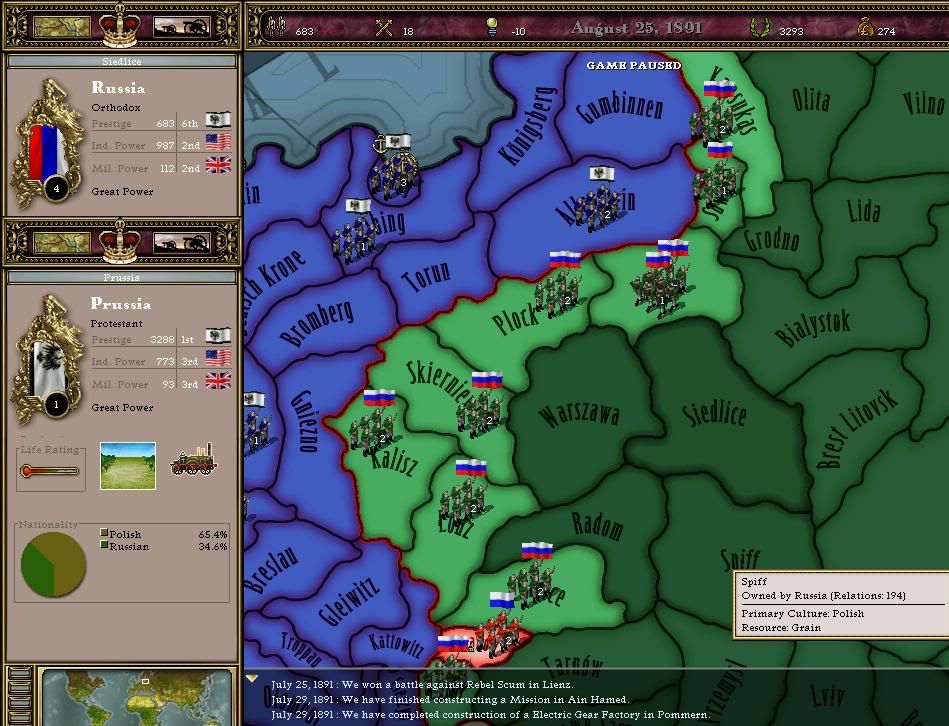
Instead, the Tsar explained that Russia’s designs were not upon Prussia, but rather against Persia. The troop buildups noticed by German spies were simply mobilizations in order to undertake a massive invasion to the south.
But, also at this summit meeting of world leaders, Alexander III laid out for Friedrich III the nature of his concerns for Prussia’s future – the same concerns which ultimately did bring these longtime allies to blows.
The relationship between Alexander and Friedrich was an odd one. Friedrich was widely considered a liberal who wished to see a traditionally conservative empire liberalized. On the other hand, Alexander was a reactionary, who took a liberalized (socialized) country and tried to return it to the old ideal of absolute monarchy. Neither ruler was to realize his dreams. But the efforts of each brought both governments to about the same place on the political spectrum – a moderate-to-conservative constitutional monarchy – during their years as contemporaries.
By contrast, both Wilhelm II and Nicholas II were conservatives whose countries were too liberal for their tastes. The elder rulers’ differences united them, and the younger rulers’ similarities did the same.
The primary conflict was between Alexander III and Wilhelm II. Alexander regarded the young Crown Prince as a rash, unstable and idiotic man who should never be entrusted with the keys to power. Alexander, with some justification, believed Wilhelm would be a dangerous addition to the volatile combination of European movements, agendas and cleavages.
Alexander expressed many of his negative feelings to Friedrich at their meeting, and each point hit a raw nerve. First, the conservative Tsar objected to the democratic reforms the Kaiser had implemented in Germany. He then unwisely dwelt upon Friedrich’s ill health and the imminence of his son’s accession. Further, the Tsar went so far as to suggest that Wilhelm be forced to renounce his claims on the throne. Or, as an alternative, that Wilhelm (who, of course, was entirely of age to rule on his own!) be subjected to a de-facto regency, with a puppetmaster directing the affairs of government in ignorance of or contravention to the wishes of the future Kaiser.
Friedrich, the proud father who knew his son’s faults but still wished to support him, reacted with indignation, and some anger, to the Tsar’s incendiary complaints. From this point on, relations between these two great powers suffered.
Each generation of these countries’ rulers – father with father, and son with son – maintained such amicable personal relations. But the older generation clashed with the other, setting up a monumental battle.
In the end, it became another of the overwhelming ironies of the 19th Century that two countries with such strong records of cooperation could have come into conflict so abruptly and violently, as they did at the end of 1894.
One of the overwhelming ironies of the 19th Century is how closely two adjacent European superpowers traveled over many decades. Ever since the days of Napoleon I, Prussia and Russia had remained, if not allies, then close collaborators.
Much of this was driven by personal politics – the rulers of Prussia and the rulers of Russia were, throughout most of this time, good friends. Deep personal ties often drew one monarch or the other to the assistance of the other in times of trouble. Both countries shared problems with minority populations who threatened to overthrow their overseers and go their own way. Neither empire could allow this, and they sometimes cooperated to achieve a solution (often a cruel one) that would work to the benefit of both governments. Frequently, this involved looking the other way while one power or the other (usually Russia, whose problems with minorities were so much further developed) used military force to impose internal order.
Prussia, having been occupied by three major world wars during the 19th Century, had found it necessary to focus their energies on developing strategies, tactics and technologies to assist in the waging of land warfare. Russia, meanwhile, acquired a thoroughly modern naval infrastructure. Prussia, whose far flung colonial outposts required a strong navy, lacked one. It was here that personal politics played a major role – one friend trusting another when geopolitical considerations might have dictated a more Machiavellian path.

Tsar Alexander III permitted Prussia to borrow the services of several top Russian naval architects for the purpose of improving the Prussian Imperial Navy. In return, Prussian industrialists assisted Russia in improving their railways into a more modern network.
A freak anomaly almost conspired, in the summer of 1891, to cast all this history of cooperation awry. In a simple, but reasonable, misunderstanding, Prussia became concerned that Russia was planning a surprise invasion. Kaiser Friedrich III made a personal visit to Tsar Alexander in order to head off a conflict.

Instead, the Tsar explained that Russia’s designs were not upon Prussia, but rather against Persia. The troop buildups noticed by German spies were simply mobilizations in order to undertake a massive invasion to the south.
But, also at this summit meeting of world leaders, Alexander III laid out for Friedrich III the nature of his concerns for Prussia’s future – the same concerns which ultimately did bring these longtime allies to blows.
The relationship between Alexander and Friedrich was an odd one. Friedrich was widely considered a liberal who wished to see a traditionally conservative empire liberalized. On the other hand, Alexander was a reactionary, who took a liberalized (socialized) country and tried to return it to the old ideal of absolute monarchy. Neither ruler was to realize his dreams. But the efforts of each brought both governments to about the same place on the political spectrum – a moderate-to-conservative constitutional monarchy – during their years as contemporaries.
By contrast, both Wilhelm II and Nicholas II were conservatives whose countries were too liberal for their tastes. The elder rulers’ differences united them, and the younger rulers’ similarities did the same.
The primary conflict was between Alexander III and Wilhelm II. Alexander regarded the young Crown Prince as a rash, unstable and idiotic man who should never be entrusted with the keys to power. Alexander, with some justification, believed Wilhelm would be a dangerous addition to the volatile combination of European movements, agendas and cleavages.
Alexander expressed many of his negative feelings to Friedrich at their meeting, and each point hit a raw nerve. First, the conservative Tsar objected to the democratic reforms the Kaiser had implemented in Germany. He then unwisely dwelt upon Friedrich’s ill health and the imminence of his son’s accession. Further, the Tsar went so far as to suggest that Wilhelm be forced to renounce his claims on the throne. Or, as an alternative, that Wilhelm (who, of course, was entirely of age to rule on his own!) be subjected to a de-facto regency, with a puppetmaster directing the affairs of government in ignorance of or contravention to the wishes of the future Kaiser.
Friedrich, the proud father who knew his son’s faults but still wished to support him, reacted with indignation, and some anger, to the Tsar’s incendiary complaints. From this point on, relations between these two great powers suffered.
Each generation of these countries’ rulers – father with father, and son with son – maintained such amicable personal relations. But the older generation clashed with the other, setting up a monumental battle.
In the end, it became another of the overwhelming ironies of the 19th Century that two countries with such strong records of cooperation could have come into conflict so abruptly and violently, as they did at the end of 1894.
Krakow is still standing, perched between two massive empires! :rofl: Is that perhaps the coming conflict will be about?
It does seem ironic that such a long history of cooperation will be brought down by a generation gap. I especially liked your descriptions of Alexander being concerned that Wilhelm would be a 'volatile mix.' It reminded me of several metaphors that compare European politics almost to a dance.
Still, I wonder what the fight will be about. I suspect the Russians are about to have another 'minority' problem and this time the Prussians intervene.
- 1

